07 January 2022
This week, we’ve been again practising alternative graphemes – different ways to write a sound. We’ve explored lots of different ways to write the ai, ee, ie sound in the English language. To help consolidate this learning, we’d like you to practise spelling these words at home.
increase bicycle decide describe exercise guide height surprise
We’ll test ourselves on Friday 14 January 2022 to see how we’ve got on.
Happy New Year!
It’s lovely to be back at Nursery after our Christmas break. We hope you’ve had a good holiday and we’re looking forward to a wonderful half-term of learning ahead. This week we have welcomed some new friends into our classroom and the children have been looking after them by being really good role-models. We hope our new friends have enjoyed their first few days with us.
The new year is always a good time for reflection and the children have been talking about Christmas and what they have been doing over the holiday. We’ve discussed (and drawn) our favourite presents and have talked about our hopes and wishes for the year to come. We’ve also had lots of chats about the weather and have looked closely at what happens to water when it is left outside in cold temperatures (and then brought back inside again). We’ve also discovered that we can see our reflections in water when it is still.
We’re all very excited about the coming weeks and we’ll be sharing lots of photos of our learning. Here’s a taster of our first week back…













Week beginning 10 January 2022
We hope you’re managing to stay happy, healthy and safe while you’re not with us here in school. You are still very much a part of our school community so please get in touch with us if you need to.
Maths
Have a go at these maths lessons and worksheets.
- Lesson 1 video, worksheet and answers.
- Lesson 2 video, worksheet and answers.
- Lesson 3 video, worksheet and answers.
- Lesson 4 video, worksheet and answers.
- Lesson 5 video, worksheet and answers.
- Lesson 6 video, worksheet and answers.
- Lesson 7 video, worksheet and answers.
- Lesson 8 video, worksheet and answers.
- Lesson 9 video, worksheet and answers.
- Lesson 10 video, worksheet and answers.
You don’t have to print the worksheets. Your child can write or draw their answers on paper. Your child’s learning will be most effective if you sit with them to pause the clip and check / praise / support your child as the clip moves on.
Don’t forget to practise number bonds on Numbots or times tables on Times Table Rock Stars. Email your child’s class teacher if you need your login and password details.
(Suggested time: 30 minutes of Maths and 15 minutes of Numbots/Rock Stars daily)
Reading fluency
This is the reading fluency that we’ll read in class this week. In school, we generally follow this sequence:
Day 1: Read the text aloud with your child listening. Read it clearly and slowly, pointing to each word as you read. Have a chat about any unfamiliar words.
Day 2: Read aloud each sentence (a full short sentence or part of a longer sentence), and have your child read it back to you. Do this ‘echo reading’ for the whole text.
Day 3: Read the text and talk about the effect of the punctuation on how you read it – pauses for full stops and expression for exclamations (!) or questions (?). Your child reads the text aloud.
Day 4: Read together with expression (just like you practised on Day 3).
Day 5: Your child reads independently and fluently.
(Suggested time: 15 minutes daily)
Phonics
We teach a phonics lesson daily at school. Your child should have a ‘Practise Phonics’ book that they bring home from school. The sticker on the front will indicate which phase they’re working at. On Phonics Play, the activities and games match the phases. If you’re unsure which phase your child is working on, email your class teacher.
If your child has completed the phonics reading books, they can use some Phase 5b, 5c, 5d or Phase 6 resources.
Use a different Phonics Play activity for :
- Revisit: Flashcard Speed Trial, Flashcard Time Challenge or Tricky Word Trucks
- Practise: Play Buried Treasure, Dragon’s Den or Picnic on Pluto
- Apply: Have a go reading one of the Comics or the Reading Robots
Login details are Sphere (user name) and Spher3 (password).
(Suggested time: 20 minutes daily)
Reading
We’ll be using this ‘RIC‘ text in class to practise comprehension skills.
RIC stands for:
Retrieve: finding information in a text
Interpret: using clues in the text or pictures to unlock information
Choice: thinking about the author’s choice of words, techniques or organisation that make the text interesting and enjoyable to read
Read for 10-15 minutes daily. You could read the books you have brought home from school or any other books you have at home. Remember that the ‘Practise Phonics’ book is designed to be read more than once, to help with segmenting (sounding out), blending (putting the sounds back together) and fluency.
(Suggested time: 10-15 minutes daily)
Writing
These writing lessons all about retelling stories. There’s a whole series of lessons, but start at Lesson 1 and work through, doing one (or maybe even two) each day. (If you’re self-isolating in your second week, stick with the series of lessons you’ve already started and aim to complete the full series.)
(Suggested time: 30-40 minutes for each)
Spelling
This week’s spellings are on our spelling page. Complete one task each day:
Day 1: Copy the words out in your best handwriting (like in our handwriting guide) – using a lead-in line or joined handwriting. (You could look out for the words in the book you’re reading at home, or any other text.)
Day 2: Practise the spellings using two of the ideas in our super spelling strategies guide. (Set yourself and others at home a challenge of using some of the words when you’re speaking, too!)
Day 3: Write separate sentences, each containing one of the spellings. (Don’t forget to show off really neat handwriting and make sure you sentence starts with a capital letter and ends with a full stop, exclamation mark (!) or question mark (?).
Day 4: Repeat Task 2 or 3.
Day 5: Get an adult at home to test you on your spellings. Practise any you spell incorrectly – you could write them out carefully until you’re sure.
(Suggested time: 15-20 minutes daily)
Topic
Our topic this half-term is history. Look at these lessons about changes in living memory. Start at Lesson 1 and work through, doing two or three in the week.
(Suggested time: 30-40 minutes)
Science
Our science lessons are all about seasons and change. Have a go at these lessons. Start at Lesson 1 and work through, doing two or three in the week.
(Suggested time: 30-45 minutes)
PE
Don’t forget to do some daily exercise!
Do two of these Five Minute Moves from Joe Wicks each day – spread them across the day as if they were playtimes, maybe!
Have a go at one of the Change for Life indoor activities or a Cosmic Kids yoga session each day. There are also lessons on balance here.
(Suggested time: 30 minutes daily)
Extra stuff…
As an extra (or as an alternative, if this helps to motivate your child)…
This sequence of lessons is all about music and rhythm.
Living and Learning is important to help us live and learn together. Here are some lesson from Oak National Academy rights and responsibilities.
Week beginning 10 January 2022
We hope you’re managing to stay happy, healthy and safe while you’re not with us here in school. You are still very much a part of our school community so please get in touch with us if you need to.
Maths
Have a go at these maths lessons and worksheets.
- Lesson 1 video and activities.
- Lesson 2 video, worksheet and answers.
- Lesson 3 video, worksheet and answers.
- Lesson 4 video, worksheet and answers.
- Lesson 5 video and activities.
- Lesson 6 video, worksheet and answers.
- Lesson 7 video, worksheet and answers.
- Lesson 8 video, worksheet and answers.
- Lesson 9 video, worksheet and answers.
- Lesson 10 video, worksheet and answers.
You don’t have to print the worksheets. Your child can write or draw their answers on paper. Your child’s learning will be most effective if you sit with them to pause the clip and check / praise / support your child as the clip moves on.
Don’t forget to practise number bonds on Numbots or times tables on Times Table Rock Stars. Email your child’s class teacher if you need your login and password details.
(Suggested time: 30 minutes of Maths and 15 minutes of Numbots/Rock Stars daily)
Reading fluency
This is the reading fluency that we’ll read in class this week. In school, we generally follow this sequence:
Day 1: Read the text aloud with your child listening. Read it clearly and slowly, pointing to each word as you read. Have a chat about any unfamiliar words.
Day 2: Read aloud each sentence (a full short sentence or part of a longer sentence), and have your child read it back to you. Do this ‘echo reading’ for the whole text.
Day 3: Read the text and talk about the effect of the punctuation on how you read it – pauses for full stops and expression for exclamations (!) or questions (?). Your child reads the text aloud.
Day 4: Read together with expression (just like you practised on Day 3).
Day 5: Your child reads independently and fluently.
(Suggested time: 15 minutes daily)
Phonics
We teach a phonics lesson daily at school. Your child should have a ‘Practise Phonics’ book that they bring home from school. The sticker on the front will indicate which phase they’re working at. On Phonics Play, the activities and games match the phases. If you’re unsure which phase your child is working on, email your class teacher.
If your child has completed the phonics reading books, they can use some Phase 5b, 5c, 5d or Phase 6 resources.
Use a different Phonics Play activity for :
- Revisit: Flashcard Speed Trial, Flashcard Time Challenge or Tricky Word Trucks
- Practise: Play Buried Treasure, Dragon’s Den or Picnic on Pluto
- Apply: Have a go reading one of the Comics or the Reading Robots
Login details are Sphere (user name) and Spher3 (password).
(Suggested time: 20 minutes daily)
Reading
We’ll be using this ‘RIC‘ text in class to practise comprehension skills.
RIC stands for:
Retrieve: finding information in a text
Interpret: using clues in the text or pictures to unlock information
Choice: thinking about the author’s choice of words, techniques or organisation that make the text interesting and enjoyable to read
Read for 10-15 minutes daily. You could read the books you have brought home from school or any other books you have at home. Remember that the ‘Practise Phonics’ book is designed to be read more than once, to help with segmenting (sounding out), blending (putting the sounds back together) and fluency.
(Suggested time: 10-15 minutes daily)
Writing
These writing lessons all about retelling stories. There’s a whole series of lessons, but start at Lesson 1 and work through, doing one (or maybe even two) each day. (If you’re self-isolating in your second week, stick with the series of lessons you’ve already started and aim to complete the full series.)
(Suggested time: 30-40 minutes for each)
Spelling
This week’s spellings are on our spelling page. Complete one task each day:
Day 1: Copy the words out in your best handwriting (like in our handwriting guide) – using a lead-in line or joined handwriting. (You could look out for the words in the book you’re reading at home, or any other text.)
Day 2: Practise the spellings using two of the ideas in our super spelling strategies guide. (Set yourself and others at home a challenge of using some of the words when you’re speaking, too!)
Day 3: Write separate sentences, each containing one of the spellings. (Don’t forget to show off really neat handwriting and make sure you sentence starts with a capital letter and ends with a full stop, exclamation mark (!) or question mark (?).
Day 4: Repeat Task 2 or 3.
Day 5: Get an adult at home to test you on your spellings. Practise any you spell incorrectly – you could write them out carefully until you’re sure.
(Suggested time: 15-20 minutes daily)
Topic
Our topic this half-term is history. Look at these lessons about changes in living memory. Start at Lesson 1 and work through, doing two or three in the week.
(Suggested time: 30-40 minutes)
Science
Our science lessons are all about seasons and change. Have a go at these lessons. Start at Lesson 1 and work through, doing two or three in the week.
(Suggested time: 30-45 minutes)
PE
Don’t forget to do some daily exercise!
Do two of these Five Minute Moves from Joe Wicks each day – spread them across the day as if they were playtimes, maybe!
Have a go at one of the Change for Life indoor activities or a Cosmic Kids yoga session each day. There are also lessons on balance here.
(Suggested time: 30 minutes daily)
Extra stuff…
As an extra (or as an alternative, if this helps to motivate your child)…
This sequence of lessons is all about music and rhythm.
Living and Learning is important to help us live and learn together. Here are some lesson from Oak National Academy rights and responsibilities.
Science learning – Seasonal Changes
This half term, we’re being biologists in our science lessons. We’ll be learning about Seasonal Changes. What an exciting opportunity to learn more about a range of things, including why we’ve had some whacky weather lately!
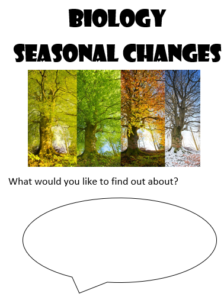
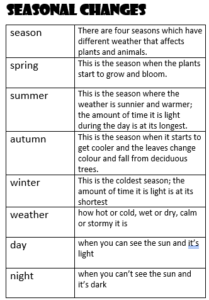
Week beginning 10 January 2022
Hi everyone
We hope you’re feeling happy and healthy at home. We miss having you in school but we want you to know that you’re still very much part of our school community. Enjoy your home learning for this week.
Maths
Follow this sequence of maths learning which is linked to multiplication and division.
- Lesson 1: video, worksheet, answers
- Lesson 2: video, worksheet, answers
- Lesson 3: video, worksheet, answers
- Lesson 4: video, worksheet, answers
- Lesson 5: video, worksheet, answers
- Lesson 6: video, worksheet, answers
- Lesson 7: video, worksheet, answers
- Lesson 8: video, worksheet, answers
- Lesson 9: video, worksheet, answers
- Lesson 10: video, worksheet, answers
You don’t have to print the worksheet. Your child can write or draw their answers on paper. Your child’s learning will be most effective if you sit with them to pause the clip and check / praise / support your child as the clip moves on.
Practise times tables on Times Table Rockstars, too. If your child is in Y3, we’re concentrating on the 8 times table. If your child is in Y4, we’re concentrating on all times tables up to and including 12 x 12. Email the class teacher if you need your child’s login and password details.
(Suggested time: 30 minutes of Maths and 15 minutes of Rockstars daily)
Spelling
Look on the homework page to find this week’s spellings. They should choose some past spellings that they feel less confident with. Your child should complete one task each day.
- Day 1: Generate more words linked to the spelling pattern or ‘rule’. You could look out for the words in the book you’re reading at home, or any other text, like a website linked to our science topic of Living Things and their Habitat.
- Day 2: Practise the spellings using two of the ideas in our Super Spelling Strategies guide. (Set yourself and others at home a challenge of using some of the words when you’re speaking, too!)
- Day 3: Write separate sentences, each containing one of the spellings. (Don’t forget to show off really neat handwriting and make sure you sentence starts with a capital letter and ends with a full stop, exclamation mark (!) or question mark (?).
- Day 4: Repeat Task 2 or 3.
- Day 5: Get an adult at home to test you on your spellings. Practise any you spell incorrectly – you could write them out carefully until you’re sure.
(Suggested time: 15-20 minutes daily)
Reading fluency
This is the text we’re using in class this week to build up fluency skills.
In school, we generally follow this sequence:
- Day 1: Read the text aloud with your child listening. Read it clearly and slowly, pointing to each word as you read. Have a chat about any unfamiliar words.
- Day 2: Read aloud each sentence (a full short sentence or part of a longer sentence), and have your child read it back to you. Do this ‘echo reading’ for the whole text.
- Day 3: Read the text and talk about the effect of the punctuation on how you read it – pauses for full stops and expression for exclamations (!) or questions (?). Your child reads the text aloud.
- Day 4: Read together with expression (just like you practised on Day 3).
- Day 5: Your child reads independently and fluently.
(Suggested time: 15 minutes daily)
Reading comprehension
We’ll be using this RIC text in class to practise comprehension skills. RIC stands for:
- Retrieve: finding information in a text
- Interpret: using clues in the text to unlock information
- Choice: thinking about the author’s choice of words, techniques or organisation that make the text interesting and enjoyable to read
Follow these lessons from Oak National Academy. There’s a whole series of lessons, but start at Lesson 1 and work through, doing one (or maybe even two) each day. (If you’re self-isolating in your second week, stick with the series of lessons you’ve already started and aim to complete the full series.)
(Suggested time: 30 minutes daily)
Writing
Follow these lessons from Oak National Academy. There’s a whole series of lessons, but start at Lesson 1 and work through, doing one (or maybe even two) each day. (If you’re self-isolating in your second week, stick with the series of lessons you’ve already started and aim to complete the full series.)
(Suggested time: 30-40 minutes for each)
Topic
Our topic this half-term is about history.
Follow these lessons from Oak National Academy. There’s a whole series of lessons, but start at Lesson 1 and work through, doing one (or maybe even two) each day. (If you’re self-isolating in your second week, stick with the series of lessons you’ve already started and aim to complete the full series.)
(Suggested time: 30-40 minutes)
Science
Our focus this half-term is about light.
These six lessons from Oak National Academy link closely to what we’ve been doing in class. Start at Lesson 1 and work through, doing two or three in the week. If you’ve previously completed on of these lessons, have a go at the ones you haven’t completed yet.
If Science really motivates your child, you could also use look at these lessons all about practical Science.
(Suggested time: 30-45 minutes)
PE
Don’t forget to do some daily exercise!
Do two or three of these Five Minute Moves from Joe Wicks each day – spread them across the day as if they were playtimes, maybe!
Try working through this series of 25 lessons from the Association for Physical Education – do two or three in the week.
(Suggested time: 5 minutes daily, plus 30 minutes for the longer PE lessons)
Extra stuff…
As an extra (or as an alternative, if this helps to motivate your child)…
Fancy learning about a new religion? You don’t have to be religious to learn about, and appreciate, religions from all around the world. Check out this set of lessons from Oak National Academy – you could choose to focus on one religion or dip into each set for an overview.
What about some Living and Learning? While you’re away from school, you could check out these lessons on keeping safe!
07 January 2022
This week’s spellings are from the common exception words list.
Year 1: school, she, so, some, the
Year 2: after, again, any, bath, because, beautiful, behind, both, break, busy
Week beginning 10 January 2022
Hi everyone
We hope you’re feeling happy and healthy at home. We miss having you in school but we want you to know that you’re still very much part of our school community. Enjoy your home learning for this week.
Maths
Follow this sequence of maths learning which is linked to multiplication and division.
- Lesson 1: video, worksheet, answers
- Lesson 2: video, worksheet, answers
- Lesson 3: video,
- Lesson 4: video, worksheet, answers
- Lesson 5: video,
- Lesson 6: video, worksheet, answers
- Lesson 7: video, worksheet, answers
- Lesson 8: video,
- Lesson 9: video,
- Lesson 10: video, worksheet, answers
You don’t have to print the worksheet. Your child can write or draw their answers on paper. Your child’s learning will be most effective if you sit with them to pause the clip and check / praise / support your child as the clip moves on.
Practise times tables on Times Table Rockstars, too. If your child is in Y3, we’re concentrating on the 8 times table. If your child is in Y4, we’re concentrating on all times tables up to and including 12 x 12. Email the class teacher if you need your child’s login and password details.
(Suggested time: 30 minutes of Maths and 15 minutes of Rockstars daily)
Spelling
Look on the homework page to find this week’s spellings. They should choose some past spellings that they feel less confident with. Your child should complete one task each day.
- Day 1: Generate more words linked to the spelling pattern or ‘rule’. You could look out for the words in the book you’re reading at home, or any other text, like a website linked to our science topic of Living Things and their Habitat.
- Day 2: Practise the spellings using two of the ideas in our Super Spelling Strategies guide. (Set yourself and others at home a challenge of using some of the words when you’re speaking, too!)
- Day 3: Write separate sentences, each containing one of the spellings. (Don’t forget to show off really neat handwriting and make sure you sentence starts with a capital letter and ends with a full stop, exclamation mark (!) or question mark (?).
- Day 4: Repeat Task 2 or 3.
- Day 5: Get an adult at home to test you on your spellings. Practise any you spell incorrectly – you could write them out carefully until you’re sure.
(Suggested time: 15-20 minutes daily)
Reading fluency
This is the text we’re using in class this week to build up fluency skills.
In school, we generally follow this sequence:
- Day 1: Read the text aloud with your child listening. Read it clearly and slowly, pointing to each word as you read. Have a chat about any unfamiliar words.
- Day 2: Read aloud each sentence (a full short sentence or part of a longer sentence), and have your child read it back to you. Do this ‘echo reading’ for the whole text.
- Day 3: Read the text and talk about the effect of the punctuation on how you read it – pauses for full stops and expression for exclamations (!) or questions (?). Your child reads the text aloud.
- Day 4: Read together with expression (just like you practised on Day 3).
- Day 5: Your child reads independently and fluently.
(Suggested time: 15 minutes daily)
Reading comprehension
We’ll be using this RIC text in class to practise comprehension skills. RIC stands for:
- Retrieve: finding information in a text
- Interpret: using clues in the text to unlock information
- Choice: thinking about the author’s choice of words, techniques or organisation that make the text interesting and enjoyable to read
Follow these lessons from Oak National Academy. There’s a whole series of lessons, but start at Lesson 1 and work through, doing one (or maybe even two) each day. (If you’re self-isolating in your second week, stick with the series of lessons you’ve already started and aim to complete the full series.)
(Suggested time: 30 minutes daily)
Writing
Follow these lessons from Oak National Academy. There’s a whole series of lessons, but start at Lesson 1 and work through, doing one (or maybe even two) each day. (If you’re self-isolating in your second week, stick with the series of lessons you’ve already started and aim to complete the full series.)
(Suggested time: 30-40 minutes for each)
Topic
Our topic this half-term is about history.
Follow these lessons from Oak National Academy. There’s a whole series of lessons, but start at Lesson 1 and work through, doing one (or maybe even two) each day. (If you’re self-isolating in your second week, stick with the series of lessons you’ve already started and aim to complete the full series.)
(Suggested time: 30-40 minutes)
Science
Our focus this half-term is about light.
These six lessons from Oak National Academy link closely to what we’ve been doing in class. Start at Lesson 1 and work through, doing two or three in the week. If you’ve previously completed on of these lessons, have a go at the ones you haven’t completed yet.
If Science really motivates your child, you could also use look at these lessons all about practical Science.
(Suggested time: 30-45 minutes)
PE
Don’t forget to do some daily exercise!
Do two or three of these Five Minute Moves from Joe Wicks each day – spread them across the day as if they were playtimes, maybe!
Try working through this series of 25 lessons from the Association for Physical Education – do two or three in the week.
(Suggested time: 5 minutes daily, plus 30 minutes for the longer PE lessons)
Extra stuff…
As an extra (or as an alternative, if this helps to motivate your child)…
Fancy learning about a new religion? You don’t have to be religious to learn about, and appreciate, religions from all around the world. Check out this set of lessons from Oak National Academy – you could choose to focus on one religion or dip into each set for an overview.
What about some Living and Learning? While you’re away from school, you could check out these lessons on keeping safe!
Happy New Year!
Happy New Year! We hope that you all had a fantastic Christmas. It was lovely to see lots of happy smiling faces when I opened the classroom door on Tuesday morning. We particularly enjoyed listening to all of their wonderful Christmas memories.
Now that Christmas is over, we head into a very cold and frost half-term. However, we love the frosty weather in Reception because it’s a fantastic stimulus for our ‘mini’ topic: Frozen Planet. Throughout the next three weeks, we will investigate ice, use our senses to describe how the weather has changed. We will also look at the coldest regions on Earth and learn about different Polar animals.
This week the children enjoyed being back with their friends and have been settling back into their daily routines.
Here are some highlights from a fantastic first week back.
Making igloos with sugar cubes.
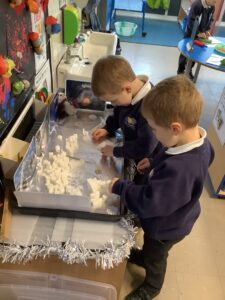
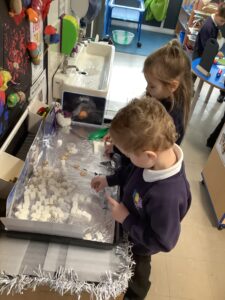
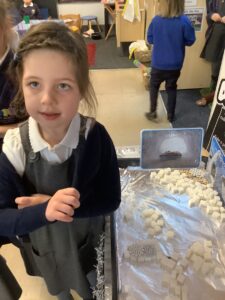
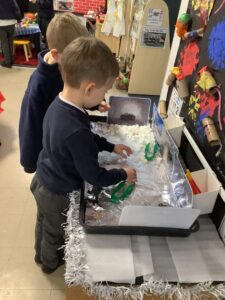
Reading the new winter books in the igloo.
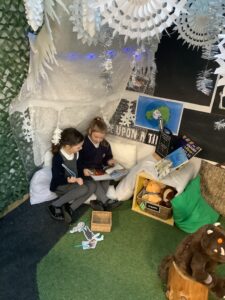
Making different arrangements with five 2d shapes.
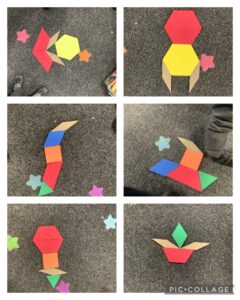
The small world and construction area was a very busy area this week. We saw lots of great teamwork, designs, and building skills.
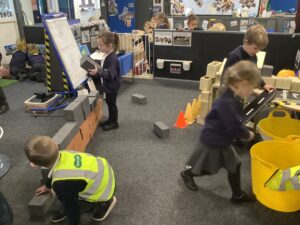
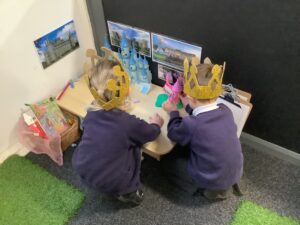
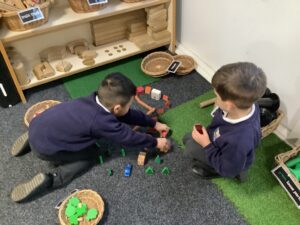
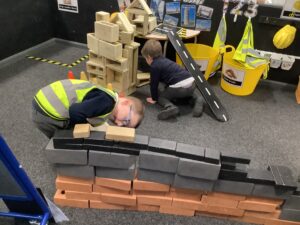
Reading
Yesterday, your child brought home a letter explaining our new phonics scheme (Little Wandle) and the new Collins e-books. Please make sure you read this letter. If you have any questions about this, please do ask!
Moving forwards, your child will read in school at least three times a week. After your child has read in school, your child will be assigned the same book as an e-book every Friday for them to show off their reading skills. They will also bring home an extra physical book to read at home.
Library books will continue to be changed every Thursday.
What will my child bring home to support their reading?
- E-book – assigned every Friday
- Extra physical book – changed every Friday
- Libary book – changed every Thursday
Reminders
- The weather is very mixed at the moment. Remember to wear a warm, waterproof coat to school and bring a named hat and pair of gloves.
- PE is every Wednesday. Please make sure your child comes to school wearing the correct clothes. If you are unsure and need a reminder, please see our uniform policy.
- Due to the current situation, the stay and learn sessions (20/01 & 07/02) are cancelled.
Home-Link Challenge
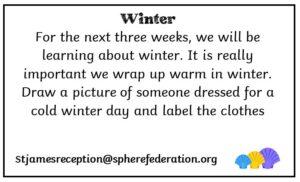
This week’s message (Friday 07 January 2022)
Happy new year! We hope 2022 has started well for you. Our first message of the year has three parts: an attendance update; some information about books we’re sending home for children in Reception and Key Stage 1; and some information about forthcoming workshops.
Attendance matters
It’s difficult deciding whether your child should attend school if they’re poorly. It’s even more difficult in these Covid times. Children have missed out on so many days of learning in school because of lockdowns and isolating, and yet we know you’re careful that your child isn’t attending school if they’re displaying any Covid symptoms.
- Thank you for taking care to look after your own child – and everyone around them, too.
- Equally, thank you for making sure that your child gets to school as much as possible, and on time, when it’s been safe to do so.
Our whole-school attendance figure for the Autumn term was 94.1%. Well over one out of every ten pupils have 100% attendance so far this year – that’s great! Here’s an update on the attendance for each year group:
- Reception: 93.7%
- Year 1: 94.9%
- Year 2: 96.1%
- Year 3: 91.9%
- Year 4: 91.7%
- Year 5: 96.3% – the highest in school, so well done!
- Year 6: 95.8%
Reading at home
This section is for parents and carers of children in Early Years and Year 1. Something similar may be happening for Year 2 children – check with your child’s class teacher.
Earlier this week, we sent some information home about a change to what books we’ll send home. Since then, a few parents have asked for a bit more information about why we’re now asking you to read e-books at home.
It might help to be clear that there are two types of book.
The practice books are short books with simple words that your child will be able to ‘decode’ (to read). In school, these are physical books; at home, it’s the same text as an e-book. Your child will have read this book at least three times in school across the week. They’re for children to practise the phonics that they’ve learnt in school – matching letters to sounds. They’re also for you to celebrate your child’s increasing phonics skills. Reading the book won’t take more than about 10-15 minutes.
The sharing books are physical books (not e-books), typically chosen by your child. They’re likely to be longer. These books are to read together and enjoy. Your child is unlikely to be able to read all of the text independently. You’ll probably spend more time over a few days reading together the sharing books than the practice books.
Here are some of the reasons we’ve chosen to use a web-based approach for the practice books at home:
- the e-books mean the hard copies of the same books stay in school and therefore there will be less chance of some going missing – this is essential as even just one missing book will undermine the impact when we practise reading in school
- we’ve been really impressed by the appearance and user-interface of the website
- we’ve consulted other school leaders – the feedback about e-books has been overwhelmingly positive
Workshops
Coming up next week is a Zoom session for parents and carers of children in Year 6, although others are welcome to attend, too. It’s to provide you with information about the end of Key Stage 2 assessments (the ‘SATs’) that will take place in the week beginning Monday 09 May.
The session is on Thursday 13 January and starts at 6pm. It’ll last around 30 minutes, and there’ll be opportunities to ask any questions that you might have.
We’ll send to Year 6 parents and carers the Zoom link. For other parents and carers, if you’re interested in attending, please either send us a message on the School Gateway app or email the school office. We’ll then email the Zoom joining details out to all those who have expressed an interest.
Talking of workshops, there are also some coming up about special education needs and disabilities (SEND). These come from Leeds Special Educational Needs and Disabilities Information and Advice Support Service (not us) – read more about the workshops here.
Next week’s message comes from Mr Wilks, who leads on Science and topics across Sphere Federation. He’ll provide an overview of the History learning that’s happening in Key Stage 1 and 2, and how you might help at home. In the meantime, have a great weekend.